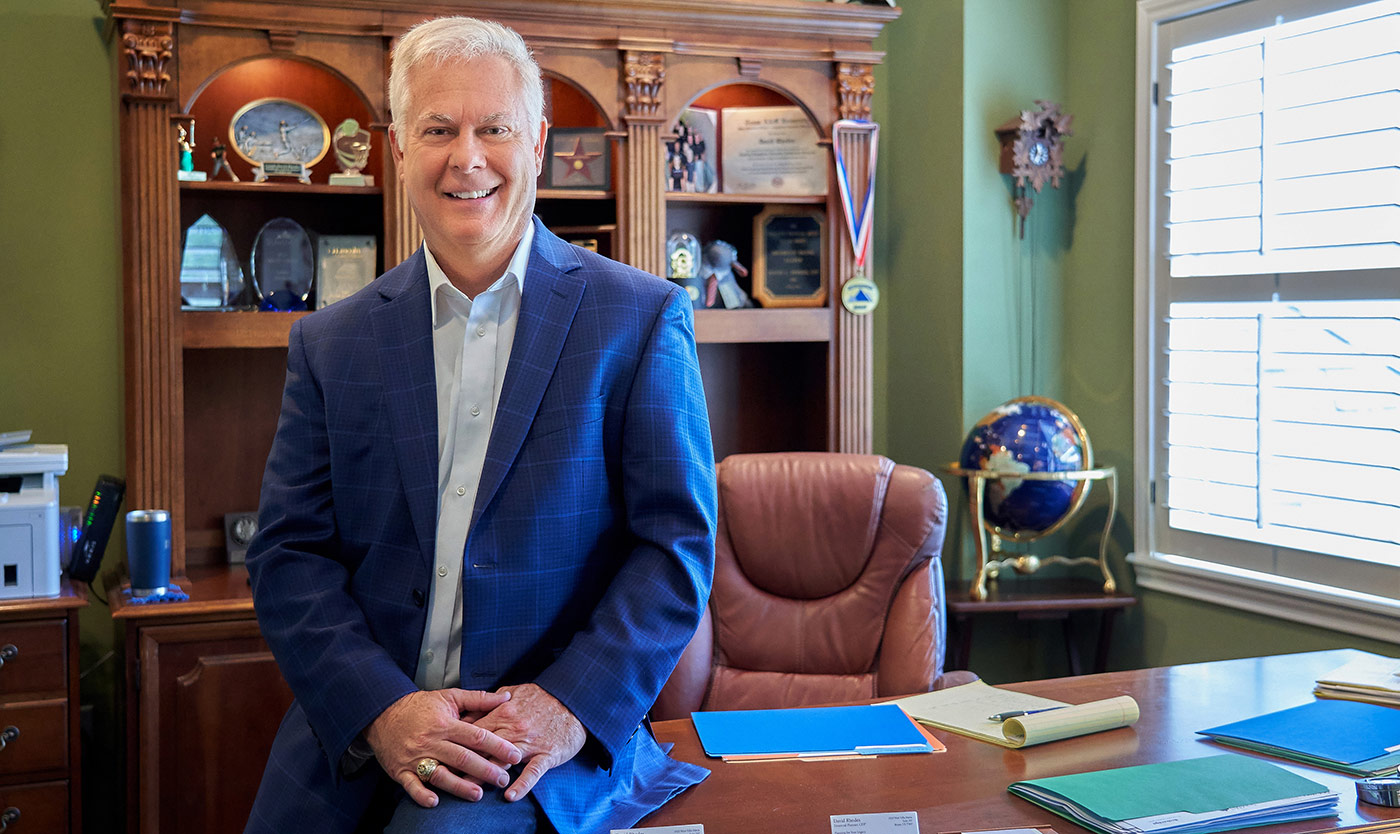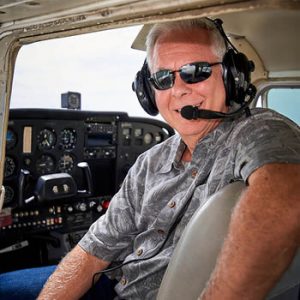Advanced strategies for wealth management and asset protection
Advanced strategies for wealth management and asset protection

David L. Rhodes, CFP, MBA • Bryan, TX
The Rhodes Financial Group • Cetera Advisor Networks LLC
Read full biography below
My background is somewhat unique for a financial advisor. In high school, I was always interested in science and math and entertained thoughts of becoming an astronaut. Unfortunately, my eyesight was less than perfect. I knew I wanted to major in engineering in college. I considered paths leading to careers in a related field, such as space propulsion systems or nuclear engineering. I attended Texas A&M and earned a degree in nuclear engineering. That led to a 10-year career as a project manager in the nuclear industry, working on initiatives such as plant licensing, quality control for nuclear fuel assemblies, and sales of nuclear fuel components.
My company was acquired by another company, and I thought it was a good time to consider my options. I could have continued in many different positions in the nuclear field but decided I wanted to explore a new, more entrepreneurial path. I entered the MBA program at the University of Dallas, which I found appealing since courses were taught by adjunct professors with professional expertise. It was a dual-track program, where I could study for a degree in finance while also taking courses in preparation for the Certified Financial Professional exam.
After graduating with my MBA, I passed the CFP exam and was ready to begin my financial-services career. I spent four years with the Principal Financial Group, which was a very capable insurance and 401(k) provider. However, I was looking for a position with a firm offering more comprehensive financial planning to clients. I was recruited by Lincoln/Sagemark Consulting, where I spent 11 years applying my skills and knowledge as a holistic financial planner and wealth manager.
While I had a lot of independence at Lincoln, I wanted to establish my own firm and founded Rhodes Financial Group in 2010. Our firm concentrates on comprehensive financial planning for individuals and business owners. Our services focus on providing clients with guidance on advanced strategies for estate and asset protection, wealth accumulation, payment techniques for estate taxes, personal risk management, and investment analysis.
Our core target segments are individuals or couples who are approaching retirement, small-business owners, and professionals such as physicians or attorneys. I have a great affinity for the small-business market, running a business myself. Small-business owners often present complex financial-planning situations that are highly satisfying to tackle. That said, we have no account minimums or client restrictions. I enjoy working with everyone from a young couple just starting their financial journey to an experienced chief executive of a successful company.

Our mission is to empower our clients with knowledge and information so they can make smart financial decisions. We believe everyone deserves to be as confident as possible about their financial future. We think this requires tactical and strategic planning throughout one’s life. It becomes especially important as clients seek to develop a tax-efficient retirement-income plan and fully consider their legacy goals.
I view each prospect and client as a unique combination of facts and emotions. As a CFP, I have been trained, and have an obligation, to tailor the financial plan for each client based on their specific goals and objectives, after digging deep into sometimes sticky areas. Every individual sees their own retirement as a very personal and usually unknown journey, of indeterminate length. In my introductory meeting with a prospective client, I talk about my professional background, what it means to be a Certified Financial Planner, my fiduciary responsibility, and the fact that everything we discuss is 100% confidential.
My firm has a proprietary process that we use to guide the client relationship and to help develop a comprehensive financial plan that can readily adapt as life circumstances change. Our approach begins with understanding in a qualitative sense the things most important to a client in their life and how they ideally envision their future unfolding.
We move through a discovery process, obtaining critical financial data from all areas of their professional and personal lives. This includes discussing time horizons, asset-protection needs, risk tolerance, and financial objectives. We also talk about any specific areas of concern in their lives, including health issues, responsibilities for elder care, educational-planning needs, specific legacy goals, or other family and business situations.
“Our mission is to empower our clients with knowledge and information.”
Next, we analyze the information to develop alternatives for consideration. Then we inform the client about the implications of selecting a particular alternative. We pay particular attention to how past investment experience or personal biases may shape how a client may feel about a particular strategy or approach—and address those concerns through an educational approach. Finally, we help to implement the alternatives selected by the client and periodically review and update the plan that has been adopted.
First, I would qualify the answer by saying it depends on their financial plan and the agreed-upon objectives and criteria that have helped shape it. I have clients of similar age and assets who have vastly different investment plans based on their personal parameters. Bottom line, there may be a role for both active and passive strategies.
That said, I am a believer in active investment management, and I educate clients on the potential benefits of professional money management. I have reviewed extensive research on many types of actively managed investment approaches and believe the holistic portfolio approach of certain managers can deliver highly desirable risk-adjusted performance over full market cycles.
That is not to say that they are always going to outperform a broad index in any given year. But I educate clients on both sequence-of-returns risk and the mathematics of recovering from bear market losses. Few clients realize, for example, that it takes a 100% gain to make up for a 50% investment loss. If losses in poor market conditions are mitigated, that allows a portfolio to become reinvested as conditions improve from a higher overall portfolio value, which can provide a significant compounding advantage over time.

I also discuss with clients other potential benefits of active management. These include the ability for managers to use their models and experience to identify trends in the market, both in a broad sense and in distinguishing between sectors or particular categories of stocks that should perform better in any given market environment. I explain that if you simply own an S&P 500 index fund, you are investing in all the companies in it—those that might perform well, those that will have indifferent performance, and those that will do poorly. Active managers strive to outperform by selecting a higher number of good sectors or stocks and a lesser number of lagging ones. I also explain that active management allows the investment manager to make changes as the market changes. When there are indications of a bear market appearing on the horizon, they can move into defensive positions or decrease the exposure of their strategies. S&P 500 index funds or ETFs cannot do that.
In terms of overall portfolio risk management and diversification, I also believe in a modified version of what might be called an endowment approach. That means diversification by asset class, including alternatives; by investment methodology; and by time frames. I examine the full universe of investment options in considering a client’s specific objectives, especially when it comes to planning for retirement income. For example, in addition to more traditional asset classes, their plans might include life insurance strategies, annuities, unit investment trusts, real estate investment trusts, precious metals, or business development companies. At the end of the day, when I am fully satisfied that a client has a full understanding of the pros and cons of each investment approach under consideration, I emphasize that only they can determine their level of comfort with any given investment.

Key criteria for evaluating third-party investment managers
David L. Rhodes, CFP, MBA, is the founder and principal financial advisor at The Rhodes Financial Group, located in Bryan, Texas. Mr. Rhodes says he is “a believer in active investment management” and educates clients on the potential benefits of professional money management.
He considers the following several important criteria when evaluating third-party managers:
- Their longevity and professional credentials in the industry.
- Whether they have a unique value proposition versus other investment management firms.
- Track record of performance in different types of market environments and versus key benchmarks.
- The quality of their support staff, customer service, and proprietary tools.
- The experience and strength of their management and research teams.
- The quality of their investment/trading execution and documentation.
 David L. Rhodes, CFP, MBA, is the founder and principal financial advisor at The Rhodes Financial Group, located in Bryan, Texas. Mr. Rhodes says, “Our services focus on providing clients with guidance on advanced strategies for estate and asset protection, wealth accumulation, payment techniques for estate taxes, personal risk management, and investment analysis.”
David L. Rhodes, CFP, MBA, is the founder and principal financial advisor at The Rhodes Financial Group, located in Bryan, Texas. Mr. Rhodes says, “Our services focus on providing clients with guidance on advanced strategies for estate and asset protection, wealth accumulation, payment techniques for estate taxes, personal risk management, and investment analysis.”
Mr. Rhodes spent his early childhood in Texas before his family moved to West Virginia. His father worked for a U.S. government agency. His mother was the director of a children’s center. Mr. Rhodes says some of his favorite childhood memories were accompanying his father on business trips, vacationing with his parents, and meeting many of the children his mother worked with.
Mr. Rhodes received a bachelor’s degree in nuclear engineering from Texas A&M University. He spent 10 years as a project manager in the nuclear energy industry. He then decided to pursue a new, more entrepreneurial career. He earned a master’s degree in finance and financial planning from the University of Dallas. He also became a Certified Financial Planner professional. Before starting The Rhodes Financial Group, he was with the Principal Financial Group and was a financial planner with Lincoln Financial Advisors/Sagemark Consulting for over 11 years.
Mr. Rhodes has been an adjunct finance professor at the University of North Texas (UNT) and taught financial-planning cases at the Professional Development Institute of UNT. He has been featured in several financial publications and earned recognition in Texas as a highly rated financial professional. He has served on the boards of the Financial Planning Association of Dallas-Fort Worth and Jonathan’s Place (a children’s charity). He is on the Planned Giving Council of Texas A&M University and also acts as a volunteer mentor for several programs at the university.
Mr. Rhodes and his wife live in College Station and have a combined family of five adult children. He enjoys spending time with his family, playing sports, volunteering at his church, and cooking. He is pursuing his private pilot’s license, has taken up skydiving, and has a lifelong passion for classic automobiles.
Disclosure: David L. Rhodes is a registered representative of Cetera Advisor Networks LLC. Securities and advisory services offered through Cetera Advisor Networks LLC (doing insurance business in CA as CFGAN Insurance Agency LLC). Member FINRA/SIPC, a broker-dealer and a registered investment advisor. Cetera is under separate ownership from any other named entity. Cetera Advisor Networks, its affiliates, and Rhodes Financial Group do not give tax or legal advice. You should consult an experienced professional regarding the tax and/or legal consequences of a specific transaction.
Certified Financial Planner and CFP are trademarks or registered trademarks of The Certified Financial Planner Board of Standards Inc.
Photography by Mark Sykes

